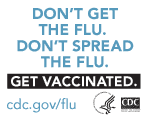CDC Features
Measles: Make Sure Your Child Is Fully Immunized

Most adults born before the 1960s probably had measles as children, and they might remember being sick for a few days with a rash and a fever. Probably several other children in their school or neighborhood had measles too. What they might not remember is that some children experienced severe complications, including pneumonia or encephalitis (swelling of the brain), or even died from measles.
Thanks to immunization, today very few children in the United States experience measles. Since a measles vaccine was licensed in 1963, measles cases in the United States have decreased by more than 99%. In 2005, only 66 cases of measles were reported in the United States and virtually all U.S. cases today have originated in another country.

While we can enjoy the success of measles vaccination, we must continue to protect children—and adults—against this disease. Measles is still common in many countries and could easily be carried by travelers to or from these areas. Today, complications from measles are still dangerous and more common in children younger than 5 years old and in adults 20 years old or older. For every 1,000 children who get measles, one or two will die from it. In fact, worldwide, measles is still a significant cause of vaccine-preventable death among children. In 2005, 311,000 children under age 5 died from measles.
The Best Protection Against Measles – the MMR Vaccine
The measles vaccine is usually administered as MMR, a combination vaccine that provides protection from three viral diseases: measles, mumps, and rubella. The MMR vaccine is strongly endorsed by medical and public health experts as safe and effective. Two doses are recommended for children—the first dose at 12 to 15 months of age, and the second dose before entering school at 4 to 6 years old.
To See If Your Child's MMR Vaccine Is Due
• Check your child's immunization record,
• Contact their healthcare provider, or
• Visit the immunization scheduler for newborn to 6-year-old children.

Paying for the MMR Vaccine
Health insurance usually covers all or most of the cost of the MMR vaccine. Children 18 years and younger may be eligible to get free vaccines through the Vaccines for Children (VFC) program. To find out more about the VFC program, contact your state VFC Coordinator. To learn more about the VFC program, visit the VFC Web site or ask your child's healthcare provider.
Some Adults Need MMR Vaccine, Too!
Anyone born during or after 1957 who has not had measles or been vaccinated is at risk and should get at least one dose of MMR vaccine. Adults who are at higher risk include college students, international travelers, and healthcare personnel.
More information and resources on measles vaccination and other vaccinations for persons 0-18
- To learn more about measles, MMR vaccine, or other childhood vaccines, visit Measles Vaccination or What Parents Need to Know
- Measles, Mumps and Rubella Vaccines: What You Need to Know (Vaccine Information Statement) (English (
 2 pages, 43 KB) or other languages*)
2 pages, 43 KB) or other languages*) - Infants and Toddlers vaccine topics
- Pre-teens and Adolescents vaccine topics
- For information in Spanish, visit Immunización
- Additional CDC features on childhood immunization: Hepatitis B vaccine, Mumps, Rubella
Page last updated: February 18, 2008
Content source: National Center for Immunization and Respiratory Diseases
Content owner: National Center for Health Marketing
URL for this page: www.cdc.gov/Features/Measles/
*Links to non-federal organizations are provided solely as a service to our users. These links do not constitute an endorsement of these organizations or their programs by CDC or the federal government, and none should be inferred. CDC is not responsible for the content of the individual organization Web pages found at these links.


